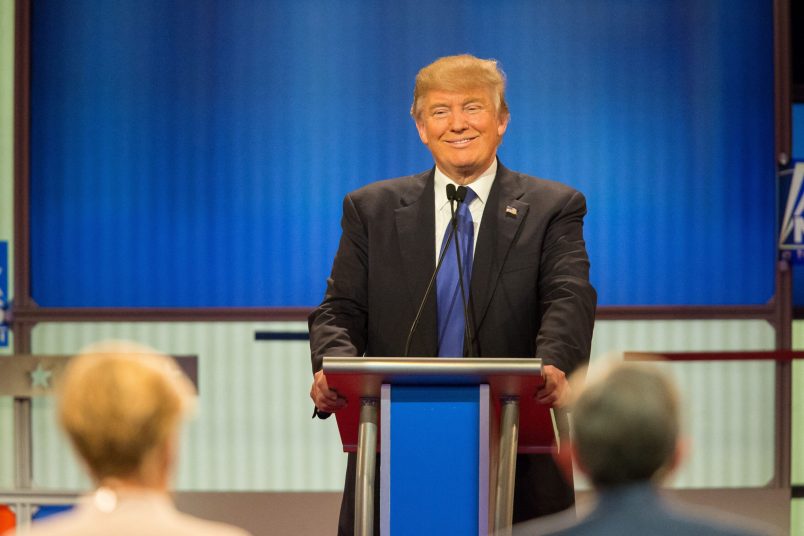Groups seeking to keep President Trump off the ballot next year notched a key legal victory this week, after a Colorado state judge sided with their view of an arcane but critical question: Does Congress need to do anything for Trump to be disqualified under the Constitution’s Disqualification Clause?
The judge ruled on Wednesday in a case brought by good government nonprofit CREW that no federal laws are required to apply the Constitution’s Disqualification Clause, a Reconstruction-era provision which bans officials who engaged in insurrection from holding future office.
At the heart of the question is whether the Disqualification Clause is self-executing. If it is, then no judge needs to rule, and Congress does not need to pass a law so that officials can bar those who engaged in an insurrection from the ballot. In other words, the Disqualification Clause is ready to go.
Trump, backed up by some conservative legal scholars, has thrown an array of arguments at judges hearing the Disqualification Clause cases to try to fend off the challenges, including an attempt to say that the provision is not self-executing, that Congress would need to pass a law specifying how it was to be applied.
The Denver judge ruled in part that Trump’s complaint was irrelevant: Colorado passed an election code which describes how disqualification applies. The judge ruled further that the provision doesn’t require “federal enforcement legislation” for states to apply it.
The same question around self-execution still confronts two other disqualification cases, in Minnesota and in Michigan.
While the Colorado decision paves the way for a hearing next week into whether Trump’s actions constituted him engaging in an insurrection, the Minnesota and Michigan cases are stuck on threshold questions, including self-execution.
The debate around self-execution emerged in legal circles after law professors William Baude and Michael Stokes Paulsen argued in an August draft law review article that the “sweep and force” of the Disqualification Clause bar Trump from ever holding office again.
Seth Barrett Tillman, an Ireland-based law professor who previously argued that the Constitution’s Emoluments Clause did not apply to the President, has maintained that Congress needs to pass legislation to enforce the Disqualification Clause. He wrote an article with Texas law professor Josh Blackman to that effect in September.
Trump’s attorneys have cited Tillman and Blackman’s work in their briefs.
The argument partly comes down to an obscure 1869 case: In Re Griffin. Then-Supreme Court Chief Justice Salmon Chase, while riding circuit, struck down a challenge to a murder conviction, where the trial judge had served as a representative in the state’s Confederate legislature. The defendant, a black man named Caesar Griffin, argued that the judge — and thereby, his conviction – should be disqualified because the judge could not serve under the 14th Amendment. But Chase ruled that the judge could not be disqualified because Congress needed to pass legislation.
It’s clear why Trump wants to use Chase’s reasoning here. But as the Colorado judge noted, it’s the only case which Trump’s supporters appear to have unearthed to support their argument.
Free Speech for People, the group which filed the Disqualification Clause lawsuits in Michigan and Minnesota, has pointed to several cases from the time in which courts upheld the disqualification of former Confederate officials under the Disqualification Clause without incident, and also noted that the Griffin case was met with widespread dismay at the time.
Or, as Baude and Paulson put it in their widely read article: “Griffin should be hooted down the pages of history.”







FRIST!
And @Threads has it all!
Self-execution? I strongly urge Trump to give it a try.
This whole disqualification issue is garbage. the Once and Future President can’t be DQ’d as he wasn’t an official in the confederacy and hasn’t been convicted of anything that would allow for him to be disqualified.
It’s just wishcasting.
The clause has nothing to do with the Confederacy or the Civil War, other than it was added as a response to both. The clause is about insurrection and wisely realized that if there was one, there likely would be others.
Don’t remember any mention of “confederacy” in the 14th Amendment. Could you perhaps show me where that reference, as opposed to the clear reference to “insurrection or rebellion” that does exist in the text of Amend. 14, Sec. 3, might be found? I’ll wait. (In re. IBecameACitizenforthis, are we witnessing evidence that the test for naturalization needs to be strengthened?)